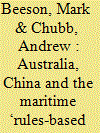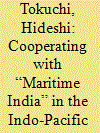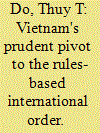| Srl | Item |
| 1 |
ID:
191562


|
|
|
|
|
| Summary/Abstract |
Despite systemic internal and external differences, Australia and China have shown striking similarities in their pursuit of disputed maritime resource and jurisdictional claims. This high-stakes area of international politics is governed by a codified, globally accepted international legal regime (the United Nations Convention on the Law of the Sea), making it an important case for examining the relationship between states’ foreign policies and the ‘rules-based international order’. In the South China Sea, Beijing is haunted by the legacy of its strong geopolitically driven support for an expansive law of the sea regime in the 1970s. Strategic considerations also drove Australia’s belated embrace of international legal processes in the Timor Sea in 2016. Before that, successive Australian governments had been as keen to pursue national maritime interests through bilateral negotiations as their Chinese counterparts. Australia’s shift was enabled by pro-Timor domestic public opinion and a confluence of geographic and commercial circumstances not present in the South China Sea.
|
|
|
|
|
|
|
|
|
|
|
|
|
|
|
|
| 2 |
ID:
181695


|
|
|
|
|
| Summary/Abstract |
The main purpose of this article is to identify a common basis for Japan and India as maritime democracies to work together for the maintenance and enhancement of the rules-based liberal international order at sea in the face of a variety of challenges in the Indo-Pacific region, China’s maritime advancement in particular. As powerful maritime democracies in the Indo-Pacific, Japan and India will be able to engage in a wide variety of maritime security cooperation. The opinions of security experts of both countries should be mustered so that bilateral cooperation keeps up its momentum. Synergy of Tracks 1, 1.5 and 2 dialogues should be pursued for maritime security cooperation. In this bilateral effort, the US-centred alliance network, of which the Japan-US Alliance is the central portion, and India’s autonomous and multi-directional approach toward international security must be intertwined effectively. Also, security dialogues between the two countries and between the two navies should work out the division of labour between Japan and India to contribute to the Indo-Pacific regional maritime security more effectively.
|
|
|
|
|
|
|
|
|
|
|
|
|
|
|
|
| 3 |
ID:
191744


|
|
|
|
|
| Summary/Abstract |
Vietnam's conceptualization of the international and regional orders has changed remarkably over the past decades. Previously an outsider if not a challenger of the western-crafted liberal order, Vietnam has in recent years increasingly leaned toward a rules-based international order. This article argues that the reason for Vietnam's changing perceptions about the liberal international order is largely threefold: domestic reform and modernization; deepened integration into the international political economy; as well as growing strategic concerns over great power coercion stemming from China's rise. Vietnam's pivot to the rules-based international order, however, is cautious given Hanoi's lingering worry over western intentions to undermine Vietnam's socialist orientation, the path dependence of Vietnam's relationships with its traditional partners as well as the occasional clashes between the old, conservative worldview and the new, open-minded thinking in shaping its foreign policy. As a result, Vietnam's vision for a rules-based international order emphasizes universally negotiated rules and institutions, rather than western-dominated ones, with a focus on the rules and norms promoted by the United Nations and ASEAN. Amid the current power shift, Vietnam supports an emerging multi-polar and multi-center order in which small and medium states like itself would have a bigger voice and greater agency.
|
|
|
|
|
|
|
|
|
|
|
|
|
|
|
|